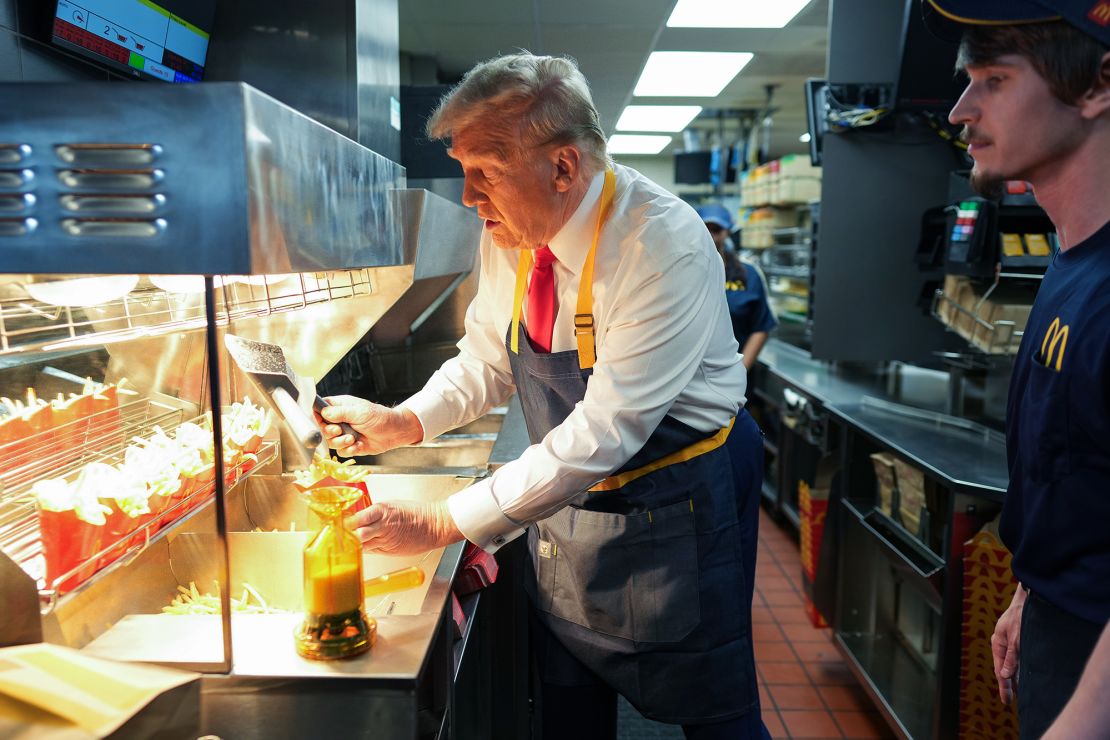Physical Address
304 North Cardinal St.
Dorchester Center, MA 02124
Physical Address
304 North Cardinal St.
Dorchester Center, MA 02124
A version of this story appeared in CNN Business’ Nightcap newsletter. To receive it in your inbox, sign up for free, here.
New York
CNN
—
2024 may not have been the best or worst year ever for McDonald’s, but it was certainly memorable.
It seemed that no matter where the news spotlight came from, the golden arches always shone somewhere on the sidelines, sometimes unintentionally on the global stage (and sometimes, a reluctant main character).
That was true in both the Republican and Democratic presidential campaigns, as Vice President Kamala Harris and her husband trotted out their roots as former workers, and President-elect Donald Trump followed up with brief, carefully orchestrated appearances at the French fry station. and McDonald’s drive-thru in Bucks County, Pennsylvania.
Another McDonald’s in Pennsylvania became the backdrop to the end of a massive manhunt this week by an employee at an Altoona location warned the police to a patron who resembled the alleged gunman who killed the CEO of UnitedHealthcare in Manhattan last week.
(The scene echoed an April 2022 subway shooting in Brooklyn, New York, in which the gunman eluded capture for 30 hours before calling in a tip about, you guessed it, himself from inside. a McDonald’s)
Major League Baseball also had a McDonald’s subplot this year, with Grimace giving the Mets World Series hopes (briefly) and New Yorkers Subway Series hopes (but then the Mets lost to the Dodgers in the playoffs, of course).
McDonald’s ubiquity in American life makes it an almost inescapable backdrop not only to consumer behavior but to cultural engagement, says Marcia Chatelain, an Africana studies professor at the University of Pennsylvania and author. “Franchise: The Golden Arches in Black America.”
“McDonald’s is a central character in any story of the 20th and 21st century because of its tremendous influence on our lives…whether you eat there or not, you have a point,” Chatelain told me. “It is one of the few institutions where everyone has a point of reference.”

Of course, sometimes the main character’s energy is less leading man and more anti-hero.
Earlier this year, the company faced a public relations problem as angry customers lashed out online over high menu prices.
And while it was true that prices were up — McDonald’s executives boasted of their ability to charge even more on earnings calls — much of that anger was symptomatic of broader consumer frustration with inflation across the economy. But it was easy for people to point to the McDonald’s receipt $3 hash brownsthat everyone can freak out about, post on TikTok and enjoy tons of support.
In that way, for people who were exhausted from stretching their budgets to pay for McDonald’s food and who (not without reason) suspected that corporate culpability was at least partly to blame.
That anger had a real impact, and McDonald’s saw it US and global sales take a hit in the spring and summer, asserting that it had pushed its “pricing power” too far. Executives quickly rolled out value meals and promotions to try to win back people, especially the low-income consumers who had been the company’s mainstay.
It seemed to be working. Sales soared thanks to the success of its $5 meals and some limited-time souvenirs that brought people back.
And then in October, just days before McDonald’s reported third-quarter earnings, an E.coli outbreak linked to onions in its Quarter Pounders sickened more than 100 people. Stocks sank, and an earnings call that should have been a comeback from a dismal quarter was overshadowed by a health crisis. It costs McDonald’s $100 million in marketing and support for franchisees who lost business in the outbreak.
It’s not just McDonald’s omnipresence that makes it a seemingly constant newsmaker in America, Chatelain notes. Also, in part, because there are fewer and fewer non-commercial public spaces for people to gather.
“When a restaurant like McDonald’s becomes a third space – a place for people to meet, a place for children to go after school, a place for the elderly to sit and drink coffee – it begins to play so many roles, the probability that it will be the scene of something significant is increasing.’
McDonald’s is always in the frame, Chatelain said, because of the way American tax dollars subsidize big business, and because the company’s scale gives it enormous leverage. “We always kind of live with McDonald’s,” he said. “And in many ways I think we’re all working at McDonald’s, whether we work in a restaurant or not.”
Correction: An earlier version of this article misstated which team the Mets lost to in the playoffs. The Mets lost to the Dodgers.